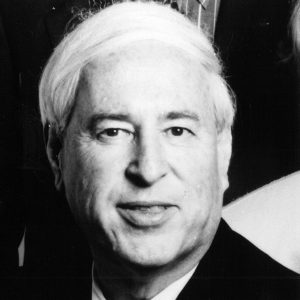calsfoundation@cals.org
Bradley Dean Jesson (1932–2016)
Bradley Dean Jesson was a lawyer and political activist who became chief justice of the Arkansas Supreme Court. In the historic school-funding case Lake View School District No. 25 v. Huckabee, Jesson played a pivotal role in settling the long legal battle to reform the funding and supervision of Arkansas public schools so that they served all children equally and adequately. Jesson, who practiced law at Fort Smith (Sebastian County) and who was known for his dignified and courteous manner as well as for his legal scholarship, first came to prominence as a confidant and adviser for Governor Dale Bumpers.
Bradley D. Jesson was born on January 26, 1932, in Bartlesville, Oklahoma, the son of Dean Abraham Jesson, who was a pharmacist, and Opal Rhaye Bradley Jesson. He spent most of his childhood in Coffeyville, Kansas. In 1954, he graduated from the University of Tulsa. In college, he had met his future wife, Mary Ellen Everett of Sand Springs, Oklahoma. He and his wife, who was a school teacher, had four daughters.
After graduation, Jesson served for three years in the U.S. Air Force, mostly in Japan. He studied law at the University of Tulsa but received his law degree from the University of Arkansas (UA) in Fayetteville (Washington County) in 1959. He was law clerk to U.S. District Judge John E. Miller of Fort Smith before joining a prominent Fort Smith law firm, Hardin & Hardin (later Hardin, Jesson & Terry), which was founded in 1909.
His close friendship with Dale Bumpers, a lawyer in Charleston (Franklin County) thirty miles east of Fort Smith, against whom he often practiced in court, brought him to Little Rock (Pulaski County) after Bumpers was elected governor in 1970. He was the governor’s legislative director, crafting bills, plotting strategy, and helping him shepherd the legislation through the Arkansas General Assembly. Bumpers asked Jesson in 1973 to be chairman of the state Democratic Party for two years and appointed him to the University of Arkansas Board of Trustees for ten years.
Jesson continued to practice law privately at what became Hardin, Jesson & Terry. When Chief Justice Jack Holt Jr. retired in the summer of 1995, Governor Jim Guy Tucker appointed Jesson to serve the last two years of the term. In December 1996, at the end of Jesson’s term, the Arkansas Supreme Court unanimously upheld the convictions of three teenagers—who became known as the West Memphis Three—arrested for the murders of three boys at West Memphis (Crittenden County) in 1993. Jesson would recall seventeen years later that he had had reservations based on the sequence of events in the confession of one of the teens but all that the justices had to go on was the record of the trial in 1994, which supported the conviction. The West Memphis Three were released in 2011, with the case remaining unsolved.
The Lake View school case first came to the Arkansas Supreme Court from the court of Judge Annabelle Imber Tuck in Pulaski County, but Justice Jesson’s court returned it to the circuit court to gather more evidence about the inadequacy and inequality in the operation of public schools across the state. The case repeatedly rose to the Supreme Court over the next ten years as the lower court, the legislature, the governor, and the Supreme Court struggled over the steps that would put the state in compliance with the Arkansas Constitution’s mandate that the state government guarantee a suitable, efficient, and equal education for children in all the schools.
In 2004, the Supreme Court named Jesson and retired justice David Newbern as special masters to evaluate all the steps that the legislature and Governor Mike Huckabee had taken with taxes, school consolidation, and redistribution of state-appropriated funds to correct the inadequacies. Jesson and Newbern found the reforms inadequate in several ways, and the Supreme Court held the state out of compliance. It would be 2007 and more legislative work before Jesson and Newbern, and then the Supreme Court, pronounced the state finally in compliance.
Jesson died on January 11, 2016, the morning of the funeral of his old friend Dale Bumpers, who had died on January 1. Hospitalized for heart trouble, Jesson had wanted a blood transfusion to give him the strength to attend his friend’s funeral in Charleston but fell too ill for the procedure. He is buried in Oak Cemetery in Fort Smith.
For additional information:
Field, Hunter. “Jesson, Ex-Chief Justice in Arkansas, Dies at 83.” Arkansas Democrat-Gazette, January 12, 2016, pp. 1B, 8B.
Ernest Dumas
Little Rock, Arkansas







Comments
No comments on this entry yet.